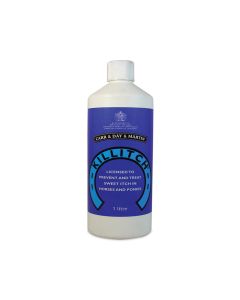
Sweet itch is a skin condition caused by an allergic reaction to proteins in the saliva of biting insects. It is one of the most common skin diseases amongst horses in the UK, affecting around 5% of horses each year.
Any horse or pony regardless of breed and age can suffer from the disease, however, research indicates that some native breeds (such as Welsh, Shire and Icelandic breeds) are more predisposed to the condition.
Typically, Sweet Itch is a seasonal condition, affecting horses most severely in the summer as this is the time of year insects are most prevalent. However, biting insects are active from March through to November, so it is important to keep an eye out for signs during all of these months. It should also be noted, affected horses show increasingly severe symptoms over time, so if not properly treated they may experience problems all year round.
What to look out for
If you see your horse or pony is beginning to scratch, it is important to take a closer look at their skin. Horses suffering from Sweet Itch may have lumpy or scaly skin that usually appears inflamed or hot to touch. The most commonly affect areas tend to be around the neck, mane and tail, but infection is not exclusive to these places. Due to the intense itchiness of this condition, horses will often cause self-trauma through excessive rubbing, scratching or biting of the affected areas. This results in hair loss, bleeding and thickening of the skin which then become clear indicators of a horse that is suffering from Sweet Itch. In severe cases, horses can become restless and even start to lose weight as a result of the condition. For the wellbeing of your horse, it is vital you spot the early signs to prevent these severe symptoms from developing.
What to do if you suspect your horse has Sweet Itch
The first thing you should do is prevent your horse from being bitten. This may entail stabling them and protecting them with a fly rug. You should then seek advice from your vet. Horses can suffer from a large array of skin diseases, such as fungal, bacterial and parasitic infections, as well as allergic reactions to bedding, insect bites, dust mites and pollens. Therefore, it is important to get the right diagnosis for your horse.
Treating Sweet Itch
Unfortunately, there is currently no cure for Sweet Itch, so the best thing you can do is prevent your horse from being bitten in the first place, but also be quick to act if you start to see symptoms developing.
Prevention- How to stop the midges from biting
Some horses can be severely affected by sweet itch after just one or two bits, so protecting your horse against insects is the key to preventing a flare-up. Follow the steps below:
- Fly rugs and masks are a must. If your horse is prone to Sweet Itch, then they might have to wear a fly rug at all times.
- Use a fly repellent. Look for a brand that also respells mosquitos and midges. Switch is a pour-on solution that acts as a long-lasting insecticide and fly repellent.
- Feed your horse garlic powder twice a day. This will make to make their sweat smell garlicky which repels the flies.
- Killitch Benzyl Benzoate is another strong insect repellent, but it also doubles up as a soothing lotion. This product has been proven to reduce the effect of sweet itch.
- Keep your horse stabled during dawn and dusk as this is the time insects are most prevalent.
- If possible, keep your horse away from standing water, rotting vegetation
and sheltered areas (such as thick tree lines) as these places are often a breeding ground for midges. If your paddock is close to either of these, they can be avoided by sectioning off the area with electric fencing.
Managing the condition
Once your horse develops the allergy, they are unfortunately likely to develop the condition each season as it is very hard to prevent any bites at all. Therefore, finding the best way to manage the symptoms is really important for reducing the discomfort that Sweet Itch causes. These are some ways to relieve the condition:
- Bath your horse in cold water, focusing on the affected areas. This can offer some short-term relief.
- Use an anti-itch shampoo as it can be an effective way to reduce irritation.
- Feed your horse omega-3 and 6. Research shows that the fatty acids can relieve the symptoms of Sweet Itch, so providing your horse with a fat source may help reduce the itching. However, remember that this should be done as part of a balanced diet. Fat sources are both calorie and energy-dense so your horse’s weight and temperament must be monitored if you introduce a high-fat nutrient.
- Consider using steroids. Your vet may be able to prescribe your horse steroids for short to medium-term relief. These must be taken with care, and only used upon instruction from your vet, as long-term use of steroids can increase the risk of laminitis.


 Forgotten your password?
Forgotten your password?  Free Delivery on all orders over £95+VAT
Free Delivery on all orders over £95+VAT













